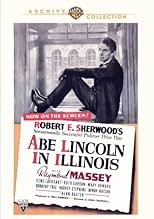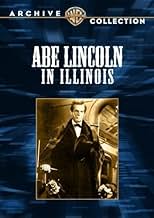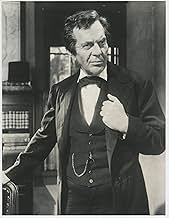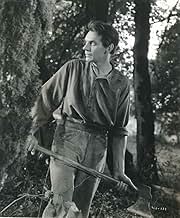IMDb RATING
7.3/10
2.2K
YOUR RATING
Humble Abraham Lincoln gains the respect of his Illinois neighbors, growing in stature and respect until he is elected President in 1860 and departs for Washington.Humble Abraham Lincoln gains the respect of his Illinois neighbors, growing in stature and respect until he is elected President in 1860 and departs for Washington.Humble Abraham Lincoln gains the respect of his Illinois neighbors, growing in stature and respect until he is elected President in 1860 and departs for Washington.
- Nominated for 2 Oscars
- 2 wins & 2 nominations total
Howard Da Silva
- Jack Armstrong
- (as Howard da Silva)
Featured reviews
I absolutely loved this movie! maybe it is because I am a history buff but I thought it was wonderful!. I am currently doing a project on Abraham Lincoln where my friends and I on working on a student directed film about Abraham Lincoln and you can not imagine how much this movie has helped me. This movie tells the tale of one of the greatest man in history and how he evolved along the way to become even greater. I can only hope that this movie will help someone see the wonders of his life as it helped me and as Honest Abe helped so many other people. I loved it when they showed his debate with Stephen Douglas. That was really the highlight of the movie because it showed him giving his real opinion and it caught my attention. His speech was amazing!! 10 thumbs up!!!! :D
If you've ever wanted to hear what Abe Lincoln sounded like, this is the film you'll want to see. Lincoln is portrayed by the late Canadian actor Raymond Massey - who, amongst many other roles, is also remembered from HG Welles' Things to Come, the screenplay of which was written by HG Welles himself. Early in Massey's career, Lincoln's son, Robert Todd Lincoln, heard him perform and was struck by the similarity between Massey's speaking voice and that of his father. Since there are no recordings of Lincoln from that era shortly before Edison invented the Gramophone, we have to rely on descriptions of his voice. Some from that time state Lincoln's voice was high-pitched, and that Massey did not do the voice properly - however, I tend to give more credence to a living witness, Lincoln's own eldest son who, though he died 14 years prior to this film, still had the opportunity to see Massey on stage and hear his voice. Massey got it right, and this is one wonderful film - too bad I haven't found it on DVD - the next time it airs on TMC I'll have to record a DVD of it for myself.
With all due respect to Henry Fonda, Walter Huston, and a myriad of other cinematic Lincolns, Raymond Massey is the Abe to end all Abes. His moving and mesmerizing performance gives us the real Mr. Lincoln in all his complexity. Alongside the warmth, compassion and humor for which we love and revere Mr. Lincoln, we see in Massey the dark side as well: the doubts, fears, indecision and deep melancholia with which Abraham Lincoln struggled his whole life, and which clashed with his fierce ambition. Ruth Gordon is superb as Lincoln's equally ambitious wife, Mary Todd Lincoln. No hagiography, this movie lets us see the Lincolns as human beings with real "issues", rather than mere heroes of history.
Besides all this, we have Massey's astonishing physical resemblance to Lincoln.
What's most amazing is that the spirit of this most quintessentially American of our American heroes should be so wonderfully captured and portrayed by.... a Canadian!
Besides all this, we have Massey's astonishing physical resemblance to Lincoln.
What's most amazing is that the spirit of this most quintessentially American of our American heroes should be so wonderfully captured and portrayed by.... a Canadian!
I have seen this film probably 15 times or more and have been a devotee of the Lincoln mythology (for lack of a better term) for nearly 20 years. I remember first seeing the film as a youngster on the same weekend as the death and funeral of President Kennedy in November of 1963. At that time, the two scenes that struck me as most memorable to my young mind was the one where the local woman tells Lincoln that he is the homeliest man in the county; and, the other scene where Lincoln is telling the slightly off-color joke to a crowd about the man fighting the bear. Also, another visual that sticks in my memory is the somewhat haunting scene where Lincoln revisits New Salem after the once thriving city has become a ghost-town.
There are several marvelous aspects of this movie. To begin with, is the near perfect physical and emotional representation of Lincoln by Raymond Massey. Given the photographs of the pre-president Lincoln, making Massey into sixteenth president seems nearly ordained from the beginning. The height, facial structure, and body type is nearly a perfect fit. Regarding how Lincoln spoke, it is hard to determine if that is an accurate representation or not. Historical accounts of Lincoln says that he had a rather high and not necessarily soothing voice. Since, it would be another 30 plus years before there is any kind of recording device, Massey's voice should seem appropriate enough.
Additionally, the cinematography is excellent. The on-location or natural shots are superior by black and white standards. Even though I am a devotee of black and white films, color films seem to have the upper hand when filming wide-open or rustic environments. The feel of the indoor scenes such as the ones within the Lincoln Springfield home is nearly perfect for the times. You can virtually smell the cigar smoke or the burning wood stove. Finally, the lighting during the campaign speech scenes are awesome.
But, the best part of the movie is how even with some artistic license the characters surrounding Lincoln are historically strong and represent in a film microcosm a very accurate historical reality of Lincoln's early years. For example, starting with Ruth Gordon's portrayal of Mary Linoln Todd. With her character, you can easily feel how much she effected Lincoln. Her persistent pressure on Lincoln to achieve political importance and her hard-nose, sometimes loving, sometimes bitter prescience is from my historical reading just about perfect. Since the film takes place before Lincoln is actually president, Mary Todd Lincoln's shenanigans within the White House or her emotional unraveling in her later years is not an issue here.
The romance demonstrated between Lincoln and Ann Rutledge, although later to be historically challenged, then even later to be considered historically (possibly) significant, is quite sadly moving. It is nicely juxtaposition-ed against the image of Mary Lincoln Todd.
Howard De Silva as New Salem's local ruffian is although somewhat embellished, still represents Lincoln's ability to relate to people from all walks of life. The film just seems to find the vital essence of young Lincoln before he became president.
The surreal, final scene of Lincoln leaving Springfield for Washington D.C. (again although actually happening during the day during a rainstorm)after giving one of his many great historical speeches ("this is where I have lived") catches the eerie but profound feel of how important his leadership is going to mean to the struggling republic. The playing of the "Battle Hymnn of the Republic" although premature, is still simple perfect.
There are several marvelous aspects of this movie. To begin with, is the near perfect physical and emotional representation of Lincoln by Raymond Massey. Given the photographs of the pre-president Lincoln, making Massey into sixteenth president seems nearly ordained from the beginning. The height, facial structure, and body type is nearly a perfect fit. Regarding how Lincoln spoke, it is hard to determine if that is an accurate representation or not. Historical accounts of Lincoln says that he had a rather high and not necessarily soothing voice. Since, it would be another 30 plus years before there is any kind of recording device, Massey's voice should seem appropriate enough.
Additionally, the cinematography is excellent. The on-location or natural shots are superior by black and white standards. Even though I am a devotee of black and white films, color films seem to have the upper hand when filming wide-open or rustic environments. The feel of the indoor scenes such as the ones within the Lincoln Springfield home is nearly perfect for the times. You can virtually smell the cigar smoke or the burning wood stove. Finally, the lighting during the campaign speech scenes are awesome.
But, the best part of the movie is how even with some artistic license the characters surrounding Lincoln are historically strong and represent in a film microcosm a very accurate historical reality of Lincoln's early years. For example, starting with Ruth Gordon's portrayal of Mary Linoln Todd. With her character, you can easily feel how much she effected Lincoln. Her persistent pressure on Lincoln to achieve political importance and her hard-nose, sometimes loving, sometimes bitter prescience is from my historical reading just about perfect. Since the film takes place before Lincoln is actually president, Mary Todd Lincoln's shenanigans within the White House or her emotional unraveling in her later years is not an issue here.
The romance demonstrated between Lincoln and Ann Rutledge, although later to be historically challenged, then even later to be considered historically (possibly) significant, is quite sadly moving. It is nicely juxtaposition-ed against the image of Mary Lincoln Todd.
Howard De Silva as New Salem's local ruffian is although somewhat embellished, still represents Lincoln's ability to relate to people from all walks of life. The film just seems to find the vital essence of young Lincoln before he became president.
The surreal, final scene of Lincoln leaving Springfield for Washington D.C. (again although actually happening during the day during a rainstorm)after giving one of his many great historical speeches ("this is where I have lived") catches the eerie but profound feel of how important his leadership is going to mean to the struggling republic. The playing of the "Battle Hymnn of the Republic" although premature, is still simple perfect.
If only we could've cloned Mr. Massey back in 1940, and then waited for a scriptwriter who could take a more controlled hand with historical accuracy than was fashionable in those days, and released the movie today...this remains my favorite treatment of one of my favorite historical figures; Massey seems born to have played Lincoln, from the obvious physical resemblance to the supposed mannerisms, and in doing so far outshines other Lincoln performances (Fonda's and Peck's come to mind). My peeve with the film is with historical detail, and I realize that Hollywood willingly sacrifices accuracy for dramatic artifice without so much as a blush...
Did you know
- TriviaAfter his success playing Lincoln in the film and on Broadway, Raymond Massey began to assume the character in real life. He often appeared at social gatherings dressed in Lincoln-esque attire, assuming a Lincoln-like manner and speech. His friend, the playwright George S. Kaufman, observed, "Massey won't be satisfied until someone assassinates him."
- GoofsWhen results for the 1860 election are being received, West Virginia is listed on the the state-by-state tally board. West Virginia didn't become a state until 1863, when it broke off from Virginia after that state had seceded from the Union.
- Quotes
Mentor Graham: Well, Abe, there are always two occupations open to those who have failed at everything else: school teaching and politics.
- ConnectionsFeatured in History Brought to Life (1950)
- SoundtracksOld Abe Lincoln Came Out of the Wilderness
(uncredited)
Traditional
Sung by chorus over opening credits
- How long is Abe Lincoln in Illinois?Powered by Alexa
Details
Box office
- Gross US & Canada
- $1,451,880
- Runtime
- 1h 50m(110 min)
- Color
- Aspect ratio
- 1.37 : 1
Contribute to this page
Suggest an edit or add missing content


























